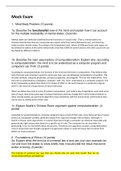Mock Exam
1. Mind-Body Problem (10 points)
1a. Describe the functionalist view of the mind and explain how it can account
for the multiple realizability of mental states. (3 points)
Mental states are identical to/defined by their functions or 'causal roles'. That is, mental states are
characterized by how they are caused (sensory input), what they cause (behavioral out), and how they
relate to other mental states. According to the functionalist view, tokens of different brain state types can
by identical to tokens of the same mental state since they fulfill the same function; the same causal role can
be played by different realizers.
1b. Describe the main assumptions of computationalism. Explain why, according
to computationalism, the mind is to be understood as a computer program and
computers can think. (3 points)
According to computationalism, the function of the mind and the brain is computation. They believe that
both the brain and computers work the same way: they use rule-following manipulations of symbols. This
includes symbols, semantic properties, syntactic properties, and program. This has two implications. First,
the brain is understood as a biological computer with the mind understood as a computer program. The
brain manipulates symbols that stand in for states of affairs in the world based on a particular program
which is the result of a long process of natural selection.
When we define the mind in terms of symbol manipulation, and modern day AI algorithms work with some
type of input, they show some type of output (behavior) and they change their mental states (relation to
other mental states), we say that AI algorithms have similarities with the human brain and therefore they
can be seen as having mind of their own.
1c. Explain Searle’s Chinese Room argument against computationalism. (4
points)
According to computationalism, computer programs have a mind of their own, since they (just like a human
brain) can manipulate symbols, generate output from input and change internal states. Although, in
Searle’s Chinese room experiment, it is shown that even though a computer can interpret input data and
generate the right output data based on a specific set of rules. The computer has no clue what it is
generating, it has no real beliefs about the process. Therefore, this argument counters computationalism,
since it shows that even though a program can generate output, it could still mean that it cannot form
beliefs on those processes.
2. Foundations of Ethics (10 points)
2a. Explain what the formula of universal law is and use your own example (so
not one from the slides) to show briefly how it would yield the result that some
action is wrong. (5 points)
The formula of universal law says that you should only act upon that maxim that can be
universalized without contradiction.
, The relevant maxim is *not* universalizable, and thus that the action in the maxim is impermissible. Note:
it’s not enough to show that if the maxim is universalized the world would be bad/horrible/undesirable.
According to Kantian Deontology, the universal law is as follows:
1. Formulate maxim clearly: in order to y, I will perform act x
2. Imagine a world where everyone who wants y, performs act x. (as if it were a law of nature)
3. Ask: is there a contradiction?
This formula describes a way to form morality on certain topics in life. In a simple equation, one can clearly
see moral judgements on one’s action. I stated my own example of the universal law beneath:
Maxim: In order to gain weight, I will eat lots of meat.
But, a world in which everyone would eat lots of meat, and global warming rises and eating meat
stimulates animal husbandry, which stimulates greenhouse gasses (and contributing to global warming is
seen as morally wrong), I will fill to gain weight through eating lots of meat.
Thus, we have a moral duty not to gain weight through eating lots of meat.
Maxim: In order to maximize fish sales, I will overfish.
• But, a world in which everyone overfishes is a world in which you would fail to maximize fish sales (there
would be no fish left, and so no sales).
• Thus, we have a moral duty not to overfish.
2b. Now apply the formula to check whether it would be permissible to not get
vaccinated in the context of the current Covid-19 pandemic. (5 points)
Maxim: in order to avoid health risks, I will not get vaccinated.
But, a world in which everyone would not get vaccinated Covid-19 goes completely rampant and you catch
it, which presents health risks. (no one is protected from the virus, and thus can the virus transport from
host to host super easy).
Thus, we have a moral duty to get vaccinated.
3. Science and Objectivity (10 points)
Summarize and contrast two of the following perspectives on the philosophy of
science: logical positivism, falsificationism, Kuhn's post-empiricism,
epistemological anarchism, Lakatosian research programmes, scientific realism,
scientific antirealism. (10 points)
Scientific realism vs scientific anti-realism
Scientific realism
According to scientific realism, science accumulates knowledge about the world by discovering true
claims which the scientists believe to be significant. Realists think that scientific theories describe and
refer to things in a world which exists entirely independently of scientists’ observation and description
of it. Realists argue that it would be a miracle if the things that humans are able to do
because of scientific findings worked if science was not a true, descriptive account of how things in
the world are.
Realists hold that science aims to provide a true description of the world, and that it often succeeds. So
a good scientific theory, according to realists, is one that truly describes the way the world is.
Science describes and refers to things in the world, which exist independently of the scientists’ observation
and description of them. Science accumulates new knowledge when it does this successfully (as it has





